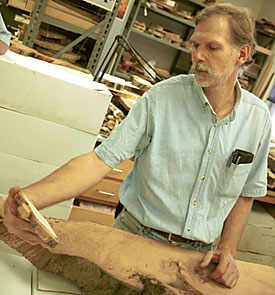 |
|
DEREKH FROUDE/Arizona Daily Wildcat
|
Senior research specialist Chris Baisan examines a tree section Friday in the UA's world-renowned Laboratory of Tree-Ring Research. Scientists are able to make a more complete history of floods, droughts and other meteorological events by studying trees.
|
|
By Rachel Williamson
Arizona Daily Wildcat
Monday September 23, 2002
Laboratory of Tree-Ring research fills weather record gaps
In a laboratory tucked away underneath Arizona Stadium, Tom Harlan studies 8,000-year-old pieces of wood, trying to solve a puzzle that would allow him to map thousands more years of floods, fires and other natural history.
The tree samples ÷ bristlecone pine tree specimens ÷ come from the White Mountains of California, which hold the highest concentration of the world's oldest living trees in an area no larger than a football field, said Harlan, an associate researcher in the Laboratory of Tree-Ring Research.
Harlan is looking to construct weather patterns older than 8,000 years. He has 8,700 years of tree-ring weather records to work with. In other words, his records date back to 6700 B.C.
But beyond 6700 B.C., there is a gap in tree-ring weather records that could be up to 300 years wide.
Until the number of years in that gap is determined, another 3,000 years of natural history cannot be placed.
During field studies a team of about 30 volunteers helps Harlan comb the hillsides picking up pieces of wood.
"The majority of wood lying on the ground does not come from that time period ÷ they're only 4,000 to 6,000 years old," Harlan said. "But when we find something that's 8,000 years old, I'm real excited."
While climate records only go back to the 1800s, Harlan's tree ring studies allow him to reconstruct climate stretching back to 6700 B.C.
Understanding weather patterns helps scientists predict droughts and can determine agricultural practices, Harlan said.
"If you wanted to build a large dam on a river, you would need to know how much water comes down each year," Harlan said. "We can reconstruct that from the tree (ring studies) even though the majority of stream-flow records are less than 100 years long."
Understanding past weather patterns will give a better perspective on present climate, said Katherine Hirschboeck, associate professor of climatology.
The color and width of tree rings tell researchers what was happening in the climate in different periods.
For example, ring-width reflects the amount of moisture in a certain time-period, Harlan said.
Fatter rings indicate better years for moisture.
Tree ring injuries also hold climate information.
Fire scars on a single tree show that the tree was struck by lightning.
On the other hand, if fire scars mark multiple trees in a concentrated region within the same time period, it can be concluded that a forest fire swept through the area.
A summer time frost ring can reflect a volcanic eruption, Harlan said. Sulfuric acid from a volcanic eruption would have blanketed the sky, turning what was supposed to be a cool front into a cold front.
The Laboratory of Tree-Ring Research where Harlan does his work is the world's largest and first laboratory of its kind.
Before an anonymous donor funded Harlan's work with $50,000 stretching over the past three years, Harlan and his wife funded their own work.
Harlan estimates that he has funding left for one additional year.

